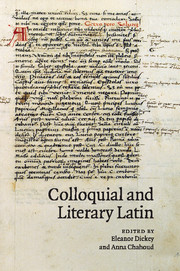Book contents
- Frontmatter
- Contents
- List of contributors
- Acknowledgements
- Foreword (David Langslow)
- PART I THEORETICAL FRAMEWORK
- PART II EARLY LATIN
- PART III CLASSICAL LATIN
- 10 Hyperbaton and register in Cicero
- 11 Notes on the language of Marcus Caelius Rufus
- 12 Syntactic colloquialism in Lucretius
- 13 Campaigning for utilitas: style, grammar and philosophy in C. Iulius Caesar
- 14 The style of the Bellum Hispaniense and the evolution of Roman historiography
- 15 Grist to the mill: the literary uses of the quotidian in Horace, Satire 1.5
- 16 Sermones deorum: divine discourse in Virgil's Aeneid
- PART IV EARLY PRINCIPATE
- PART V LATE LATIN
- Abbreviations
- References
- Subject index
- Index verborum
- Index locorum
15 - Grist to the mill: the literary uses of the quotidian in Horace, Satire 1.5
Published online by Cambridge University Press: 04 April 2011
- Frontmatter
- Contents
- List of contributors
- Acknowledgements
- Foreword (David Langslow)
- PART I THEORETICAL FRAMEWORK
- PART II EARLY LATIN
- PART III CLASSICAL LATIN
- 10 Hyperbaton and register in Cicero
- 11 Notes on the language of Marcus Caelius Rufus
- 12 Syntactic colloquialism in Lucretius
- 13 Campaigning for utilitas: style, grammar and philosophy in C. Iulius Caesar
- 14 The style of the Bellum Hispaniense and the evolution of Roman historiography
- 15 Grist to the mill: the literary uses of the quotidian in Horace, Satire 1.5
- 16 Sermones deorum: divine discourse in Virgil's Aeneid
- PART IV EARLY PRINCIPATE
- PART V LATE LATIN
- Abbreviations
- References
- Subject index
- Index verborum
- Index locorum
Summary
The engagement of the Satires of Horace with everyday Latin has generally been a given. After all, the poet himself programmatically referred to them as sermo merus, straight conversation (Sat. 1.4.48), not to be compared to the high-register language of an Ennius, for example (1.4.60–1). But it does not take much to see that this position is disingenuous, as studiedly disingenuous as Catullus' praise of Cornelius Nepos and diminution of his own work as ‘trifling’, or as selectively true as Cicero's distinction:
quid tibi videor in epistulis? nonne plebeio sermone agere tecum? nec enim semper eodem modo. quid enim simile habet epistula aut iudicio aut contioni? quin ipsa iudicia non solemus omnia tractare uno modo. privatas causas et eas tenuis agimus subtilius, capitis aut famae scilicet ornatius. epistulas vero cottidianis verbis texere solemus.
(Fam. 9.21.1; cf. p. 39 above)But tell me now, how do you find me as a letter writer? Don't I deal with you in colloquial style? The fact is that one's style has to vary. A letter is one thing, a court of law or a public meeting quite another. Even for the courts we don't have just one style. In pleading civil cases, unimportant ones, we put on no frills, whereas cases involving status or reputation naturally get something more elaborate. As for letters, we weave them out of the language of everyday.
(trans. D. R. Shackleton Bailey)- Type
- Chapter
- Information
- Colloquial and Literary Latin , pp. 255 - 265Publisher: Cambridge University PressPrint publication year: 2010
- 2
- Cited by



